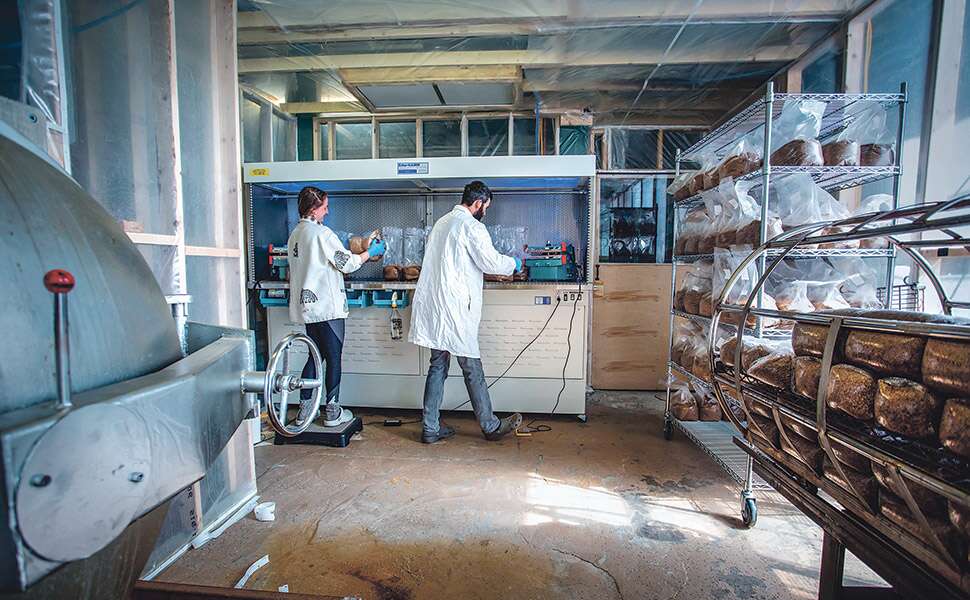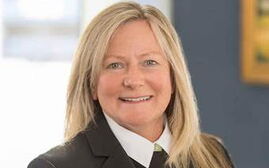
Elevators to success: How pitch programs prepare start-ups for traditional funding
 Photo / Tim Greenway
Eliah Thanhauser, a founder of North Spore Mushroom Co., a Westbrook startup, generated $150,000 in much-needed cash through pitch competitions. More important, he learned valuable lessons in how to pitch his business, which produces mushroom-growing kits for home growers.
Photo / Tim Greenway
Eliah Thanhauser, a founder of North Spore Mushroom Co., a Westbrook startup, generated $150,000 in much-needed cash through pitch competitions. More important, he learned valuable lessons in how to pitch his business, which produces mushroom-growing kits for home growers.
Last year North Spore Mushroom Co., a Westbrook startup, won top prizes in back-to-back competitions — $100,000 in Greenlight Maine’s entrepreneurial pitch contest and $50,000 in Gorham Savings Bank’s small business competition LaunchPad.
The cash was great, says co-owner Eliah Thanhauser. It paid for additional equipment, new hires and needed infrastructure. It positioned the company, which produces mushroom-growing kits that are sold on Amazon and elsewhere for $25, for the expected launch of a new value-added food product.
“The competitions were incredibly helpful,” says Thanhauser. “They gave us capital we wouldn’t have otherwise been able to access all at once, which we injected into the business to use for growth.”
Even more valuable was learning how to prepare for the pitch contests.
“It’s a good way to think about your business,” he says. “I saw it as an opportunity to refine how we present our business to the world for future pitches, whether that’s to a bank or investors or anyone else.”
Competition organizers and sponsors find the same value.
“While the prize money is the carrot we dangle, by the end of the first day folks are pretty convinced they’ll get more than they could possibly hope for, before the pitch competition, in the form of skill-building,” says Alex Birdsall, organizer of Mount Desert 365’s Business Boot Camp & Pitch Competition, which started in 2018 and offers a judges’ award of $7,500 and audience award of $2,500. “This program elevates the level of hard business skills you need.”
A leg up
Competitions, along with mentoring and training programs, are designed to provide a leg up to startups and early businesses as they travel the path from bootstrapping and sweat equity to becoming bankable and investable. They share an interest in helping entrepreneurs achieve a level of stability that’s helpful from a couple of angles. For one, they help businesses grow in a sustainable way.
“What we’ve found is that there are a lot of accidental entrepreneurs,” says Birdsall. “They love baking or say they love flowers. They don’t do it because they love profit-and-loss statements. They don’t necessarily need to be able to keep their books, but they do need to be able to ask the right questions of professional bookkeepers.”
The programs also mitigate the risks that bankers consider on a loan application.
“We have a fiduciary responsibility to our depositors to make sure the loans we make are prudent,” says Dan Walsh, executive vice president of commercial banking at Norway Savings Bank, a lead sponsor of Maine Center for Entrepreneurs’ Top Gun and Cultivator programs. “That’s not to say we won’t take risks. However, when you have a startup that might not have been a business a year ago and they don’t have a track record, that suggests they really need equity capital rather than debt.”

Startups typically depend on personal capital, friends and family loans and even credit card debt.
“Then we steer them toward resources available in the community, like SCORE,” Walsh says. “And we stay close with them. When they get to the point where they’re bankable, then we can talk about working capital. It’s very much an art, not a science.”
Gorham Savings Bank seeks to similarly help early businesses through its LaunchPad small business competition and a second program within LaunchPad, the Emerging Idea Award, which comes with a $10,000 grant and $10,000 of in-kind business and marketing services.
Now in its seventh year, LaunchPad is “a unique thing for a bank to do,” says Mark Girr, Gorham Savings’ senior vice president of marketing and communications. “Banks typically lend money. They don’t typically just give it away.”
Gorham Savings recognized there’s a lack of funding for early-stage businesses that need an extra boost to become bankable.
“This is an opportunity go outside of the box of normal lending,” adds Kim Donnelly, Gorham Savings’ senior vice president and director of business banking.
Life happens
Pitch competitions and boot-camp education programs, often linked to ongoing support and mentorship networks, expose early stage entrepreneurs to facets of running a business. In turn, that mitigates risk both for bankers and investors.
“All of those entrepreneurs are absolutely driven and committed to the success of their business,” says Walsh. “But the challenge is that sometimes things happen outside of their business. The economy tanks or a customer has a challenge with cash flow and can’t pay on time. If a bank doesn’t move forward with a loan opportunity, it doesn’t mean they don’t believe in the entrepreneur. It’s just that the entrepreneur doesn’t have the fall-back in case life happens.”
The risks are similar for other investors, says John Burns, managing director of Maine Venture Fund. He cites the perils of investing in companies that have no cash flow or have expenses that outweigh revenues, sometimes by a lot.
“Then it’s too risky for traditional, so they won’t make a loan, unless it’s personally guaranteed or fully collateralized with marketable assets,” says Burns.
That’s where venture capital and angel investors might come in, says Burns. But the risks are still there.
“Angel investors and/or seed stage venture funds like ours want to know the company can ultimately penetrate into the commercial market to the degree that they start to generate revenue and build enterprise value,” Burns says. “They might have a monthly burn rate for many months or many years. There’s a ton of risks. And most companies don’t make it. As the manager of a venture fund, I might look favorably on a company that’s been through Top Gun or other quality accelerators or incubators, because at least I know they’ve had some guidance.”

Instilling confidence
The goal is to “de-risk” companies, Maine Center for Entrepreneurs Executive Director Tom Rainey says of the organization’s Top Gun and Cultivator programs. “We try to help these companies avoid errors that lead to their going out of business,” Rainey says. “A lot of it is about getting them educated on their options and what it will take for them to secure funding at different levels.”
When do entrepreneurs become bankable? “In my experience, it’s about showing you have a team in place that’s experienced and instills confidence in the funding source, whether it’s an investment group or a bank,” says Rainey.
Burns agrees. “The No. 1 thing investors look at is the team,” says Burns. “Are they flexible, can they take the blows and adapt and be resilient, because it’s one challenge after the other, and they come all at once.”
Another key factor investors study is how a startup’s product would fit into the market.
“Is there really a need for this product or is it just nice to have?” Burns says. “Is it a cure or a Band-Aid? How much did they research their market, have they spent time talking with customers, have they put out a beta product?”
Boot camps are designed to ensure entrepreneurs understand all the angles.
“They’ve done the research and they might be great at sales, but weak on the financial side, or vice versa,” says Walsh of Norway Savings. “They might be good on knowledge of the product but they don’t know how to get the message out. These programs put them through all these areas of expertise. They don’t guarantee success. But they increase the probability of success.”
North Spore’s Thanhauser agrees. North Spore started in 2014 with $10,000 of personal cash invested by Thanhauser and two partners. It generated revenue within six weeks. Small loans and grants followed. A large bank declined to issue a line of credit, but a smaller community bank did. Now, with 10 full-time employees, revenue is on track to grow 50% this year. Further growth is likely, he says. That’s why Thanhauser continued to participate in programs, most recently the Goldman Sachs 10,000 Small Business Program, which provides business education, a support network and access to capital.
“It has been a slow process for me to become aware of so many business resources that have greatly helped North Spore grow,” Thanhauser says. “Everything helps.”
As an aside, though, Thanhauser mentions he’s skeptical of the value of competitions for non-winners.
“These competitions help the winners. But the people who don’t get the money, I don’t know if they help much,” he says. “People putting on the competitions say it’s good to get these companies out there. But a lot of these companies, unless you’re, say, a tech company, you are not necessarily going to attract private equity or venture capital.”
Others disagree. “The majority of people don’t win the contests, but they get this education process,” says Bob Montgomery-Rice, president and CEO of Bangor Savings Bank, a sponsor of Greenlight Maine and Scratchpad Accelerator. “And usually you see most of the other businesses continue to grow. Just getting that mentoring and exposure is good.”














0 Comments